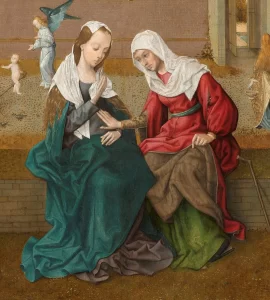Ord Om ordet
Davids nøkkel
Denne prekenen for fjerde søndag i advent ble holdt i Mount Saint Bernard i 2015, da søndagen falt på 20. desember. Teksten inngår i min bok Entering the Twofold Mystery.
Micah 5:1-4: And they shall dwell secure.
Hebrews 10:5-10: Lo, I have come to do thy will, O God.
Luke 1:39-45: Blessed is she who believed that the Lord’s promise would be fulfilled.
Since the eighth century, the century of Charlemagne, the Latin Church has spent the last week of Advent invoking Christ under a series of solemn invocations, urging him to come quickly. We know them as ‘O Antiphons’ for each begins with an exclamatory O. Today, 20 December, we call out: O Key of David! It is a suggestive title. What does it mean? The answer lies in the twenty-second chapter of Isaiah. There, we find the City of David, Jerusalem, in total turmoil. It is at war, surrounded by overwhelming enemy forces. This crisis is a God-sent scourge. By means of it, the Lord would call the people ‘to weeping and mourning, to baldness and girding with sackcloth’. Yet what do they do instead? They indulge in an orgy of oblivion. Supposing there’ll be no tomorrow, they break down their houses to fortify the city walls for just a day or two. They slay their oxen, kill their sheep, roast the meat, pour tankardfuls of wine and chant: ‘Let us eat and drink, for tomorrow we die.’ There is no trace of joy in this merriment. It is charged with the dark energy of despair. A besieged city that acts like that has lost all hope of rescue. Its feasting is a mockery of fate. It is a burp in the face of the gods.
 Blamed for this breakdown of morale is the city’s steward Shebna. His name is synonymous with vanity. While the nation collapsed round about him, Shebna made monuments to himself: a magnificent carved tomb; a splendid habitation. He thought he could buy immortality for money. He thought his status would make him immune to existential threat. Not so. Isaiah reveals his future: ‘The Lord will hurl you away, O strong man. He will seize hold of you, whirl you round and round, and throw you like a ball into a wide land.’ I am citing from the RSV. The Hebrew is more graphic. The word rendered ‘ball’ is literally a ‘dumpling’. So much for Shebna’s airs! The Lord will pick him up like a handful of dough, squeeze him into a compact, greasy little lump, then – plop! – chuck him out of the kitchen window. His place will be taken by another, one worthy of the steward’s robe and girdle. This man, Eliakim, will be ‘a father to the inhabitants of Jerusalem’. He will care for them and take charge of their welfare. ‘And I will place on his shoulder’, the oracle continues, ‘the key of the house of David; he shall open, and none shall shut; he shall shut, and none shall open.’ O Key of David!
Blamed for this breakdown of morale is the city’s steward Shebna. His name is synonymous with vanity. While the nation collapsed round about him, Shebna made monuments to himself: a magnificent carved tomb; a splendid habitation. He thought he could buy immortality for money. He thought his status would make him immune to existential threat. Not so. Isaiah reveals his future: ‘The Lord will hurl you away, O strong man. He will seize hold of you, whirl you round and round, and throw you like a ball into a wide land.’ I am citing from the RSV. The Hebrew is more graphic. The word rendered ‘ball’ is literally a ‘dumpling’. So much for Shebna’s airs! The Lord will pick him up like a handful of dough, squeeze him into a compact, greasy little lump, then – plop! – chuck him out of the kitchen window. His place will be taken by another, one worthy of the steward’s robe and girdle. This man, Eliakim, will be ‘a father to the inhabitants of Jerusalem’. He will care for them and take charge of their welfare. ‘And I will place on his shoulder’, the oracle continues, ‘the key of the house of David; he shall open, and none shall shut; he shall shut, and none shall open.’ O Key of David!
The desperate feasting of the Jerusalemites happens because they think they are caught in a trap. They can’t conceive of a way out. Into this despair, the Lord sends hope. He assures them that there is in fact a key, a key that both opens and shuts. There is no deadlock. There’s potentially a future. But will they want it? Will we? Our world today is in many ways like beleaguered Jerusalem. When we look at the cruel wars that are raging, at the movement of peoples, at climate change, at the state of the Church, can’t we ourselves feel tempted at times to draw the blinds, pour another large drink, and just wait for it all to end? May we always have Christian courage to resist this moral defeat, this abandonment of hope! There is no state of affairs so arrested that the Key of David can’t unlock it. It is a master key in the absolute sense. ‘Come’, we sing in today’s O Antiphon ‘come and lead forth the captive from prison, come and release those who sit in darkness and the shadow of death.’ That holds for every prison, every darkness, every death, even the most intimate. There is an exit. 
Our readings for this Sunday provide rich illustration of God’s intervention in apparently hopeless situations. Our Gospel portrays the embrace of two women great with child: one of them elderly, thought to be barren, the other a virgin. Who would have thought?! The prophet Micah, a contemporary of Isaiah, affirms that the lost sons of Israel, seemingly lost to hope, will come back; that they who are fearful now ‘shall dwell secure’. A ‘new’ ruler, whose origin is ‘of old’, will make it all happen. Again, who would have thought?! The greatest paradox, though, is contained in our reading from Hebrews. It speaks daring words, placed in our Saviour’s mouth when he ‘came into this world’. His task was to redeem it, to renew creation, to destroy death and forgive sins. What sort of vast dispensation would that require, what armies of angels? Let us listen again to Christ’s declaration of the arms he takes for this battle: ‘A body thou hast prepared for me. Then I said, Lo, I have come to do thy will, O God!’ This is the key that opens and none can shut, shuts and none can open: a complete surrender to God’s will and a firm resolve to put it into practice in the body – that is, in the concrete reality of life. It is Israel’s key, Mary’s key, the key of Christ, the Son of David. Will it be our key, too, yours and mine? Christmas, brothers and sisters, is not, in essence, a cosy affair. It presents us with an offer of new life, new resolution. It calls on us to make a choice. Will we let the key of obedience and faith turn in our creaking locks? If we do, what joy, what freedom we shall know – what peace! He whom we await ‘is our peace’. Let’s not waste time seeking it anywhere or in anyone else. Amen.
